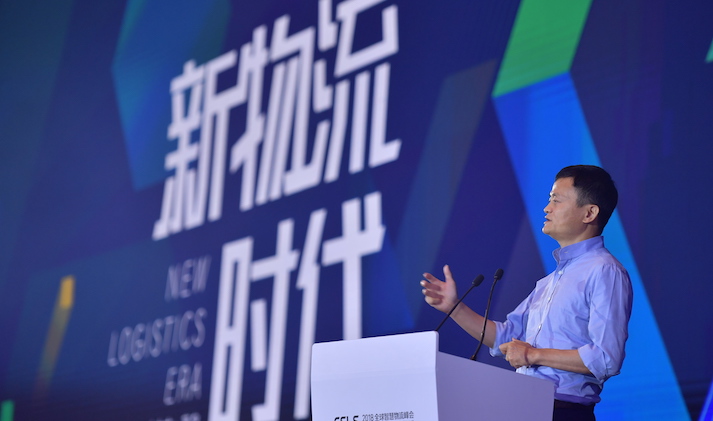
Alibaba Executive Chairman Jack Ma said Thursday the group will invest billions of dollars to build the technical backbone for a smart logistics network aimed at improving delivery reach and efficiency, as well as sharply driving down costs.
“This network is not only national, but global,” said Ma. “[We want to] connect every courier, connect every warehouse, every hub, every city and every house.”
Ma said the target of Cainiao Network, Alibaba’s logistics arm, is to eventually ensure single-day delivery across China and 72-hour delivery to the rest of the world. At present, Cainiao has reduced cross-border shipping times from an average of 70 days to less than 10 days for some countries. Within China, Cainiao’s single-day and second-day delivery now covers 1,500 counties and districts.
Cainiao’s smart network should push logistics costs, which currently comprise about 15% of China’s gross domestic product, down to under 5%. He noted the figure is around 7% to 8% of GDP in countries with more-developed logistics systems.
“If we can use data to solve the problem of low transport efficiency and high logistics costs, we can create huge profit margins for the manufacturing industry and logistics sector. I think this is what Cainiao and our logistics industry should do for the country,” Ma told an audience at a Cainiao event in Hangzhou.
“This network was established by Cainiao, but it doesn’t belong to Cainiao. It belongs to all logistics companies. Logistics companies are Cainaio’s most important partners ‚Ķ we need to provide our partners with core technology and core products to make our logistics partners stronger,” he added.
Today, about 100 million parcels are carried using Cainiao’s logistics platform each day, and the electronic bills and labels used have helped digitize and standardize the industry infrastructure.
China’s logistics landscape has undergone massive change in recent years, reaching unprecedented scale. Ma noted that the industry started from zero parcels generated by e-commerce to now delivering 130 million parcels per day, while there are about 5 million people working at courier and food-delivery companies in the country, and seven delivery companies have gone public.
“Twelve or 13 years ago, I said we’ll see 1 billion packages per year. Nobody believed me. But today, weekly package volumes exceed 1 billion,” said Ma. With that pace of change, it’s not unreasonable that the peak handling during the company’s 11.11 megasale will become the daily average a decade later, he predicted.
“We have to think clearly today. We must understand what infrastructure is needed to support 1 billion parcels a day,” Ma said. “We can’t avoid the future. World trade will change because of logistics. Global trade will go from containers to packages, from trading between countries to trading between companies. All this change, we should be ready to prepare and fight today.”




